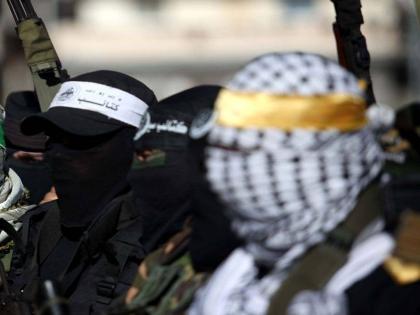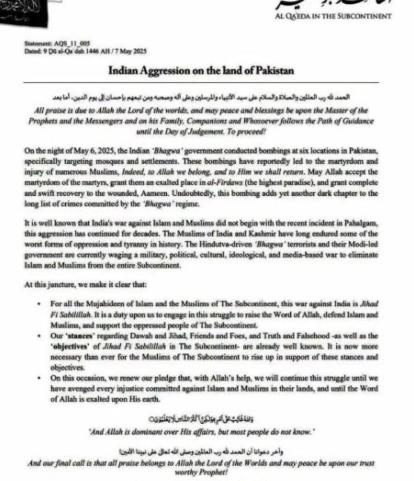"We Will Avenge Every Drop Of Blood": India-Pakistan Tensions Escalate as Al Qaeda Issues Threat After 'Operation Sindoor'
By Lokmat English Desk | Updated: May 8, 2025 11:16 IST2025-05-08T11:15:10+5:302025-05-08T11:16:19+5:30
In a decisive military operation following the deadly terrorist attack in Pahalgam, India launched ‘Operation Sindoor’, targeting nine terrorist ...

"We Will Avenge Every Drop Of Blood": India-Pakistan Tensions Escalate as Al Qaeda Issues Threat After 'Operation Sindoor'
In a decisive military operation following the deadly terrorist attack in Pahalgam, India launched ‘Operation Sindoor’, targeting nine terrorist camps deep inside Pakistani territory. The airstrikes, carried out on the night of May 6, 2025, involved over 80 Indian fighter jets and reportedly resulted in the deaths of more than 100 terrorists. The Indian government has not officially confirmed the exact number of casualties but described the mission as a “preemptive and punitive strike” aimed at dismantling terrorist infrastructure responsible for repeated cross-border attacks.
In response, terrorist outfit Al-Qaeda released a statement through its media arm, As-Sahab Media, condemning the Indian strikes. The terror outfit claimed that India deliberately targeted mosques and civilian settlements, resulting in the deaths and injuries of several Muslims. Referring to the Indian government as the "saffron regime", the statement accused it of waging a systematic war against Islam and Muslims.
Al-Qaeda vowed retaliation, stating:
"We pledge, with the help of Allah, to fight until we avenge every drop of blood unjustly shed. The oppression against Muslims in India and Kashmir has gone on for too long, and it is our religious duty to respond."The group further claimed that the attacks were part of a broader campaign by the Modi government to culturally and politically suppress Islam within the country. Meanwhile, Pakistan’s Prime Minister Shehbaz Sharif issued a sharp response, stating that the Pakistani military had been on high alert following intelligence inputs about possible Indian action. He described the Indian airstrikes as a violation of sovereignty and declared Pakistan's readiness to respond “with full force if provoked further.”Sharif also demanded an independent investigation into the Pahalgam attack, which India has cited as the trigger for its operation.
Also Read: Pakistan propaganda continues, floods social media with fake videos
The nine terror camps, which were targeted by Indian armed forces on Wednesday, include Muzaffarabad's Sawai Nala Camp and Syedna Belal Camp, Gulpur Camp, Abbas Camp, Barnala Camp, Sarjal Camp, Mehmoona Joya Camp, Markaz Taiba and Markaz Subhan in Bahawalpur.After India's precise military operation, a National Security Council meeting was chaired by Prime Minister Shehbaz Sharif and attended by cabinet ministers, chief ministers, all services chiefs and senior officers. Pakistan described the strikes as "unprovoked” and an “unlawful act of war". Pakistan also issued a statement saying that in consonance with Article 51 of the UN Charter, they reserve the right to respond, in self-defence, “at a time, place, and manner of its choosing” to avenge the Indian strikes. Earlier, Defence Minister Khawaja Asif said Pakistan is ready to "wrap up" tensions with India if New Delhi de-escalates the situation. Meanwhile, Pakistan also announced a 48-hour closure of its airspace for all air traffic after the strike. However, aviation authorities reopened the airspace after an eight-hour closure. The escalating tensions between the two nuclear-armed nations have sparked concern across global diplomatic circles, with calls for restraint and dialogue growing louder to prevent further destabilization in South Asia.
Open in app